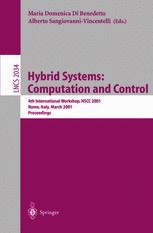

Most ebook files are in PDF format, so you can easily read them using various software such as Foxit Reader or directly on the Google Chrome browser.
Some ebook files are released by publishers in other formats such as .awz, .mobi, .epub, .fb2, etc. You may need to install specific software to read these formats on mobile/PC, such as Calibre.
Please read the tutorial at this link: https://ebookbell.com/faq
We offer FREE conversion to the popular formats you request; however, this may take some time. Therefore, right after payment, please email us, and we will try to provide the service as quickly as possible.
For some exceptional file formats or broken links (if any), please refrain from opening any disputes. Instead, email us first, and we will try to assist within a maximum of 6 hours.
EbookBell Team

0.0
0 reviewsThis volume contains the proceedings of the Fourth Workshop on Hybrid - stems: Computation and Control (HSCC 2001) held in Rome, Italy on March 28-30, 2001. The Workshop on Hybrid Systems attracts researchers from in- stry and academia interested in modeling, analysis, synthesis, and implemen- tion of dynamic and reactive systems involving both discrete (integer, logical, symbolic) and continuous behaviors. It is a forum for the discussion of the - test developments in all aspects of hybrid systems, including formal models and computational representations, algorithms and heuristics, computational tools, and new challenging applications. The Fourth HSCC International Workshop continues the series of workshops held in Grenoble, France (HART’97), Berkeley, California, USA (HSCC’98), N- megen, The Netherlands (HSCC’99), and Pittsburgh, Pennsylvania, USA (HSCC 2000). Proceedings of these workshops have been published in the Lecture Notes in Computer Science (LNCS) series by Springer-Verlag. In line with the beautiful work that led to the design of the palace in which the workshop was held, Palazzo Lancellotti in Rome, resulting from the col- boration of many artists and architects of di erent backgrounds, the challenge faced by the hybrid system community is to harmonize and extract the best from two main research areas: computer science and control theory.